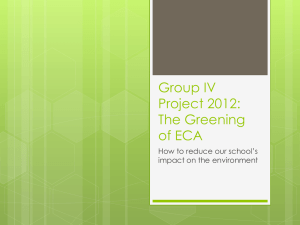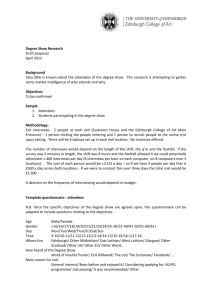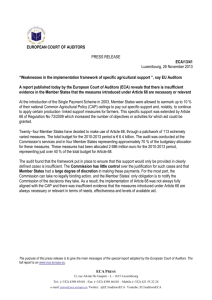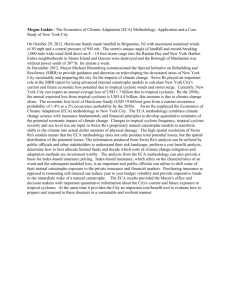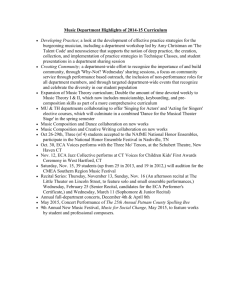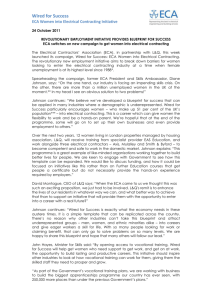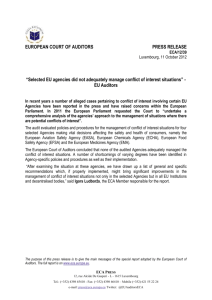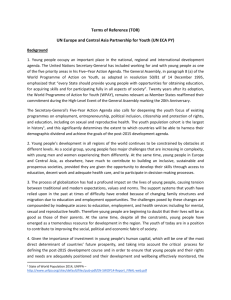The ICA&D concept
advertisement
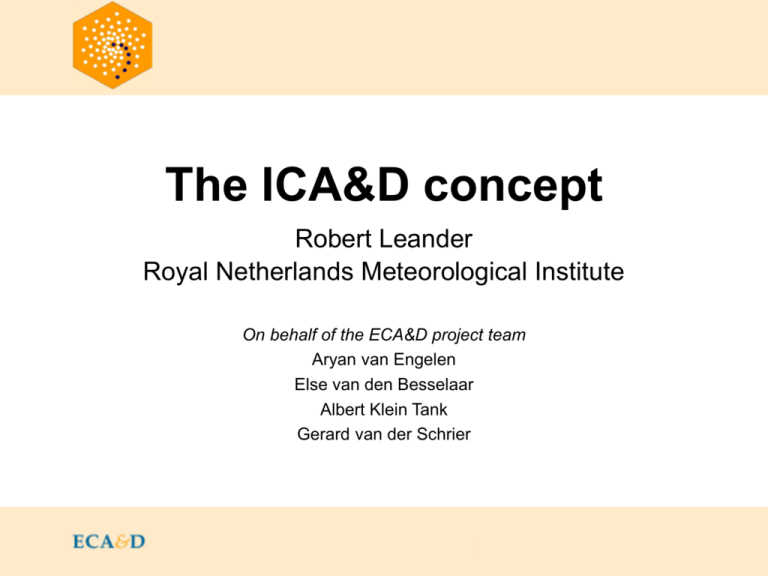
The ICA&D concept Robert Leander Royal Netherlands Meteorological Institute On behalf of the ECA&D project team Aryan van Engelen Else van den Besselaar Albert Klein Tank Gerard van der Schrier http://eca.knmi.nl Contents Contents • Definition and purpose what is the ICA&D concept? • Key components Components and their connection Implementation requirements • Look and feel of the web-portal A swift browse through the ECA&D site Let’s fantasize about the WACA&D site Definition and purpose Contents International Climate International Climate Assessment & Dataset Characteristics • • • • Daily station data Quality controlled Regional Climate changes indices ICA&D examples ECA&D, SACA&D, LACA&D…. For example ECA&D, SACA&D, LACA&D…. why not WACA&D ? ??? Key components Contents Development Maintenance of data + metadata Update cycle “Fullcycle”: •QC •Blending •Index calculation •Homogeneity tests •Trends, climatology, extreme analysis MySQL database Apache Webserver Key components Contents Development Operational Maintenance of data + metadata Update cycle “Fullcycle”: •QC •Blending •Index calculation •Homogeneity tests •Trends, climatology, extreme analysis MySQL database MySQL database Apache Apache Webserver Webserver Update cycle Manual intervention required Update cycle “Fullcycle”: •QC •Blending •Index calculation •Homogeneity tests •Trends, climatology, extreme analysis Bash-scripting, C/F77 routines • Updating series + metadata • Quality control • Blending stations • Indices calculation • Homogeneity tests • Trend analysis climatology, anomalies and extreme analysis …. Update cycle Update cycle “Fullcycle”: •QC •Blending •Index calculation •Homogeneity tests •Trends, climatology, extreme analysis Bash-scripting, C/F77 routines • Updating raw series + metadata • Quality control • Blending stations • Indices calculation • Homogeneity tests • Trend analysis Fully automated process climatology, anomalies and extreme analysis …. Blending • Extending and completing a station series with data from nearby stations Update cycle “Fullcycle”: •QC •Blending • Stations within certain proximity and within a certain range of altitude are considered, depending on the element •Index calculation •Homogeneity tests •Trends, climatology, extreme analysis SYNOP data is the least preferred source …. only used if no suitable historical data available Index calculation • ETCCDI indices (same as in RClimdex) • Additional Impact-related indices Update cycle “Fullcycle”: • Comfort indices like UTCI, Tourism index •QC •Blending • Specific “agricultural” indices Viticulture-related indices •Index calc. •Homogeneity •Trends, climatology, extreme analysis • Hydrological indices like hydrologic intensity HY-INT (Giorgi) And more … new index definitions can smoothly be integrated into the system Homogeneity • Four tests on some indices (RR, TGG, etc): Update cycle “Fullcycle”: •QC •Blending •Index calculation •Homogeneity •Trends, climatology, extreme analysis • Von Neumann Ratio Test • Buishand Range Test • Alexanderson SNHT • Pettit Test } Identify break • Classification of series: suspect doubtfull usefull 3 or more tests detect change 2 tests detect break not more than 1 test detects break Various analyses Update cycle “Fullcycle”: • For those series whose series are not suspect • Climatology •QC •Blending •Index calculation •Homogeneity • Anomalies •Trends, …. • Returnvalues • Trends New raw data Database (devel) Contents Update cycle MySQL database •Raw daily series •Blended daily series •QC results •Annual index series •Homogeneity test results •Station metadata •Analyses results • Trends • Climatology • Extremes • ….. Webserver (devel) •Primary variables (daily resolution): tg,tx,tn,rr,hu,ss,sd,cc,ff,fx,dd Operational database Web server(s) Contents • PHP – based • JPGRAPH for plotting • MapServer / MapScript for mapping Internal Database External Database Apache Apache Webserver Webserver Internal web-server External web-server Infrastructure Summarizing: • Separate linux-based development and operational system. • Web-content generation real-time • Apache 2.0, MySQL 5.0.45, PHP 5.1.6 • Mapserver 4.10.2 (maps) , Jpgraph (plots) • C, shell scripting (update cycle) • Fortran (some of the calculations, gridding) ECA Website walkthrough.. http://www.ecad.eu 2009 ECA&D : data inventory 2009 ECA&D : (Raw) Daily data Raw and blended daily station data for the take… …..but ONLY the PUBLIC data !! The participant decides 2009 ECA&D walkthrough: Daily data Raw and blended daily station data for the take… …..but ONLY the PUBLIC data !! The participant decides 2009 ECA&D : Extreme events 2009 ECA&D : Extreme events 2009 ECA&D : Indices 2009 ECA&D : Timeseries plots 2009 ECA&D : Index time series May 2010 May 20 2009 ECA&D : Indices maps 2009 ECA&D : Indices maps 2009 ECA&D walkthrough 2009 ECA&D : Index map: RR1 2009 ECA&D : Index map: RH 2009 ECA&D : Climatology RR1 2009 ECA&D : Anomalies RR1 2009 ECA&D : Trend RR1 WACA&D : CWD Trend http://82.157.123.58/rcc/utils/mapserver/trend.php http://192.168.2.10/rcc/utils/mapserver/trend.php WACA&D : CWD Trend WACA&D : CWD Trend 2009 WACA&D : CWD Trend WACA&D : CWD Trend http://82.157.123.58/rcc/utils/mapserver/index-availability.php http://192.168.2.10/rcc/utils/mapserver/index-availability.php Conclusion ICA&D is useful in climate monitoring • • • • • Participants can profit from the analyses Still they have full control over data distribution The system is simpel in design and straightforward to maintain and extend We are there to share the software, our innovations and assist in the local setup The ICA&D concept is very well portable Meteorologist: What is the use of climate data ??” Meteorologist: What is the use of climate data ??” Thank You for your attention! Merci beaucoup pour votre attention!
